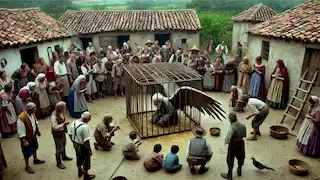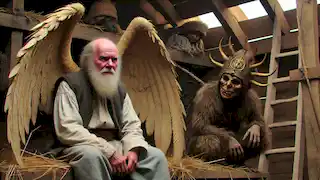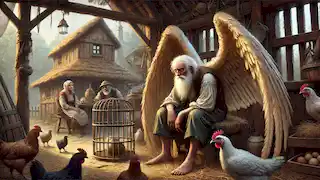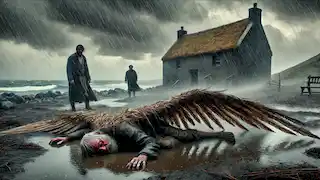In the midst of pelting rain and fierce winds, Pelayo, the owner of a small house near the shore, stumbled upon a most bizarre and unsettling discovery in his yard. There, lying face down in the mud, was an old man. But this was no ordinary old man—his frail body was weighed down by enormous wings, filthy and half-plucked, stretching from his back like those of a giant bird. Bewildered, Pelayo called for his wife, Elisenda, and together they stood over the creature, unsure of what they had found. The storm had raged on for three days, bringing crabs crawling through their house and filling their home with the rank odor of decay. Pelayo and Elisenda were busy cleaning up the remains of the downpour when they first noticed the strange visitor in their courtyard. The sight of him, huddled in the dirt, covered in grime and exuding an air of decrepitude, made them question if he was even human. His wings, though grand, were tattered and gave him the appearance of a pitiful, fallen angel—or something else entirely. Pelayo and Elisenda debated what to do. They fetched a neighbor woman, known for her knowledge of the supernatural, who quickly concluded that the man was an angel fallen from the sky. Yet, instead of awe, the winged man evoked pity and discomfort in those who saw him. His appearance did not align with the grandeur or splendor they had come to associate with angels from the biblical stories. Instead, he seemed weak, ragged, and in a state of suffering. The priest from the nearby village, Father Gonzaga, was summoned to assess the situation. Upon arrival, Father Gonzaga was immediately skeptical. The old man with wings did not speak Latin—the language of God, the Church, and the angels. He did not even seem aware of his divine nature, if he had any at all. Father Gonzaga declared he would write to higher authorities in Rome for guidance but cautioned against hasty judgments. The news of the old man with enormous wings spread like wildfire. Soon, the yard was filled with curious villagers, eager to catch a glimpse of this strange creature. Some threw food at him, while others prodded him with sticks to see if he would react. The old man remained silent, his eyes barely flickering, as if indifferent to the chaos around him. Over time, the villagers' wonder turned to apathy as the winged man seemed less like a divine being and more like a weary, bedraggled beggar who had somehow survived a great misfortune. The arrival of the winged man brought an unexpected change to Pelayo and Elisenda’s lives. While they initially considered getting rid of the creature, perhaps by setting him adrift on a raft or abandoning him to the sea, they soon realized that his presence was a source of income. People came from all over to see the “angel,” and Elisenda, ever practical, began charging an admission fee to visitors. The small yard became a spectacle, drawing pilgrims, tourists, and curiosity seekers. Pelayo and Elisenda’s house, once humble and unremarkable, became the center of attention. They quickly amassed wealth from the constant stream of visitors. Their fortunes grew while the old man remained confined to a chicken coop in the backyard, treated as a sideshow. He endured endless abuse from the crowds—mockery, thrown stones, and food scraps—yet he never resisted. His feathery wings, once majestic, became increasingly tattered, and his health seemed to deteriorate. Despite his pitiful condition, the winged man’s endurance only seemed to attract more attention. Speculation about his true identity continued. Some insisted he was an angel sent to test the villagers' faith, while others claimed he was a devil or some form of trickster. Yet, no matter how much the crowd pressed for answers, the old man with wings offered none. Amid the flurry of activity surrounding the winged man, another miracle occurred: a woman, who had been transformed into a tarantula for disobeying her parents, arrived at the village. Her story, combined with her grotesque appearance—half-human, half-spider—captivated the people, and soon the crowds that once marveled at the angel shifted their attention to this new oddity. The village, now accustomed to strange phenomena, welcomed the distraction. The spider-woman, unlike the old man, willingly told her story, answering the villagers’ questions and asking for their pity. With the arrival of the tarantula woman, interest in the winged man began to wane. Fewer visitors came to see him, and Elisenda no longer found it necessary to charge for admission. In a strange twist of fate, the couple grew wealthier and more prosperous, despite the diminishing relevance of their winged guest. Months passed, and the winged man continued to live in the coop, largely ignored and left to his own devices. His once-fragile wings slowly began to recover, and though still filthy and bedraggled, they appeared less frail than before. The villagers had long since lost interest in him, and even Pelayo and Elisenda treated him more like a burden than a source of fascination or revenue. Father Gonzaga, still awaiting a response from Rome, remained perplexed by the old man’s nature. He could not reconcile the contradictions: the man's wings, his silence, his seeming lack of divine purpose. The priest prayed for guidance but received no clarity. He was left, like the villagers, to wonder if they had misjudged the situation from the start. Was the old man truly an angel, or had they simply imposed their own desires for wonder and miracles onto a strange and helpless creature? Meanwhile, Pelayo and Elisenda’s home grew ever larger and more luxurious as they continued to reap the benefits of their earlier enterprise. Elisenda, in particular, took comfort in the wealth that allowed her to escape the hardships of daily life, even as the winged man remained a neglected figure in the backyard. She dreamed of a life free from the strangeness that had invaded their world, free from the winged man and the bizarre occurrences that had disrupted their once quiet lives. One afternoon, as Elisenda was looking out from her newly constructed balcony, she noticed something unusual in the yard. The winged man, who had been quiet and passive for so long, was now attempting to stand. His wings, though still worn and scraggly, flapped weakly at his sides. It seemed as though the long recovery period had given him new strength. Elisenda watched in astonishment as the old man, once a feeble and broken figure, began to slowly rise into the air. The sight of the winged man lifting off the ground filled her with a mix of emotions—relief that he was finally leaving, yet also a lingering sense of loss. After all, the creature’s presence had brought them wealth, even if he had been little more than an oddity for the villagers to gawk at. As the old man ascended into the sky, flying clumsily and with difficulty, Elisenda felt a strange pang in her heart. The winged man, with his awkward, ungraceful flight, seemed to embody both the miraculous and the mundane—an angel that wasn’t quite an angel, a man that wasn’t quite a man. His departure was as quiet as his arrival, unnoticed by the villagers who had long since moved on to other curiosities. But for Pelayo and Elisenda, the strange chapter of their lives had come to an end. The old man with enormous wings, who had once been the source of mystery, speculation, and fortune, was gone as suddenly and inexplicably as he had arrived. As the winged man disappeared into the horizon, Elisenda stood on her balcony, gazing after him with a sense of closure. She thought about how profoundly their lives had changed since the day he appeared, and how, despite all the chaos and confusion he had brought, they were now better off. Yet, even in the face of their newfound prosperity, there remained a lingering uncertainty about what the winged man had truly been. Pelayo, too, was left to ponder the creature’s true nature. In the quiet moments, after the winged man had left, he found himself thinking back to the first night when they discovered him, mud-covered and silent in the courtyard. Was he an angel, sent to test their faith or deliver a message they had failed to understand? Or was he simply a strange, otherworldly being, whose purpose they would never fully grasp? As the years passed, the memory of the old man with enormous wings began to fade. The villagers no longer spoke of him, and Pelayo and Elisenda’s children grew up without ever really understanding the significance of what had happened. The coop where he had been kept eventually fell into disrepair, and the once bustling yard returned to its former quiet, mundane existence. {{{_04}}} For all the time the winged man had spent in their lives, he had left without truly revealing his purpose or identity. He was a mystery they could never fully solve, an enigma that, in the end, mattered less to them than the comforts and wealth he had inadvertently brought. As the old man flew off into the distance, Pelayo and Elisenda were left with the knowledge that some things in life are beyond explanation, and perhaps, not everything is meant to be understood.The Arrival of the Winged Man

The Transformation of a Village

The Enigmatic Creature
The Departure of the Winged Man

Reflections on the Angel
A Very Old Man with Enormous Wings
Reading Time: 8 min

About Story: A Very Old Man with Enormous Wings is a Fantasy Stories from colombia set in the 20th Century Stories. This Poetic Stories tale explores themes of Loss Stories and is suitable for Adults Stories. It offers Moral Stories insights. An angelic mystery that tests the bounds of human compassion and curiosity.
















